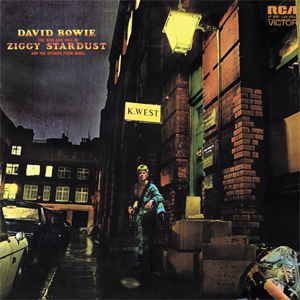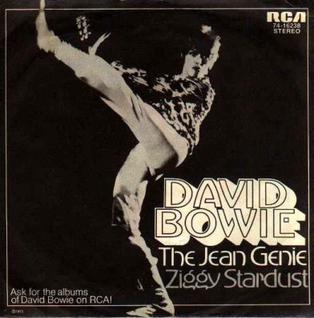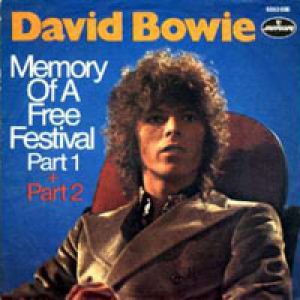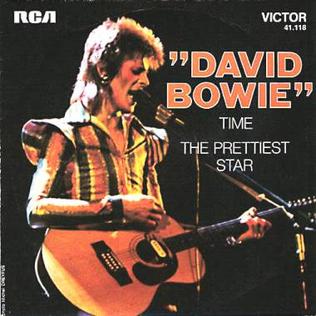Songs
This live album features a quite different setlist to the one found on Ziggy Stardust –The Motion Picture (1983) (namely that,with the exception of The Jean Genie,the setlist contains no songs from Aladdin Sane,which were very present by the end of the tour),which was recorded nine months afterwards and similarly bootlegged prior to its belated official release. The Santa Monica recording is generally considered a superior representation of the Ziggy Stardust concerts in terms of both sound quality and standard of playing. [6] In 1981, NME critics Roy Carr and Charles Shaar Murray called it not simply "the performer's best ever bootleg",but "far superior to either of Bowie's official location recordings" to that date, David Live (1974) and Stage (1978). [4]
A gold disc edition with the DJ's closing remarks at the end was made available in the Netherlands,while in the US a special limited box set was released that included a T-shirt,a key chain and a short video. The video was not actually from the Santa Monica show,but was previously unseen footage from a silent colour film made at a concert in Dunstable,England on 21 June 1972. The video was combined with the live audio recording from the Santa Monica concert. This box was limited to only 1000 copies. In addition,an even more limited edition was released as a small wooden box with Bowie's image carved into the lid,and a brass plate indicating the series number. Only 250 copies were made. [6] [7]
This semi-legal release was one in the series of mid-nineties releases by MainMan,Bowie's former management company during the seventies (other ones being Rarestonebowie and the Ava Cherry &The Astronettes album People from Bad Homes ). All these albums were released without Bowie's approval and are currently out of print.
An official version – Live Santa Monica '72 –was issued by EMI/Virgin in 2008.

The Rise and Fall of Ziggy Stardust and the Spiders from Mars is the fifth studio album by the English musician David Bowie, released on 16 June 1972 in the United Kingdom through RCA Records. It was co-produced by Bowie and Ken Scott and features Bowie's backing band the Spiders from Mars — Mick Ronson (guitar), Trevor Bolder (bass) and Mick Woodmansey (drums). It was recorded from November 1971 to February 1972 at Trident Studios in London.

Aladdin Sane is the sixth studio album by the English musician David Bowie, released in the United Kingdom on 19 April 1973 through RCA Records. The follow-up to his breakthrough The Rise and Fall of Ziggy Stardust and the Spiders from Mars, it was the first album he wrote and released from a position of stardom. It was co-produced by Bowie and Ken Scott and features contributions from Bowie's backing band the Spiders from Mars — Mick Ronson, Trevor Bolder and Mick Woodmansey — with the pianist Mike Garson, two saxophonists and three backing vocalists. Recorded in London and New York City between legs of the Ziggy Stardust Tour, the record was Bowie's final album with the full Spiders lineup.

"The Jean Genie" is a song by the English singer-songwriter David Bowie, originally released in November 1972 as the lead single to his 1973 album Aladdin Sane. Co-produced by Ken Scott, Bowie recorded it with his backing band the Spiders from Mars − comprising Mick Ronson, Trevor Bolder and Mick Woodmansey. According to Bowie, it was "a smorgasbord of imagined Americana", with a protagonist inspired by Iggy Pop, and the title being an allusion to author Jean Genet. One of Bowie's most famous tracks, it was promoted with a film clip featuring Andy Warhol associate Cyrinda Foxe and peaked at No. 2 on the UK Singles Chart.

"Suffragette City" is a song by the English singer-songwriter David Bowie. It was originally released in April 1972 as the B-side of the single "Starman" and subsequently appeared on his fifth studio album The Rise and Fall of Ziggy Stardust and the Spiders from Mars (1972). The song was later reissued as a single in 1976, with the US single edit of "Stay" as the B-side, to promote the compilation album Changesonebowie in the UK. Co-produced by Bowie and Ken Scott, it was recorded by Bowie at Trident Studios in London with his backing band the Spiders from Mars, consisting of Mick Ronson, Trevor Bolder and Mick Woodmansey, at a late stage of the album's sessions. The song was originally offered to English band Mott the Hoople, who declined it and recorded Bowie's "All the Young Dudes" instead. It is a glam rock song that is influenced by the music of Little Richard and the Velvet Underground. The lyrics include a reference to Anthony Burgess' novel A Clockwork Orange and the lyric "Oooohh wham bam, thank you, ma'am".

Ziggy Stardust: The Motion Picture is a live album by the English musician David Bowie, released in October 1983 in conjunction with the film of the same name. The music was recorded during the Ziggy Stardust Tour at the Hammersmith Odeon in London on 3 July 1973, although the album was not issued by RCA Records until 1983. Prior to that it had existed in bootleg form, notably His Masters Voice – Bowie and the Spiders From Mars' Last Stand.
The Spiders from Mars were rock singer David Bowie's backing band in the early 1970s, and initially consisted of Mick Ronson on guitars, Trevor Bolder on bass guitar, and Mick Woodmansey on drums.

"Memory of a Free Festival" is a song by the English singer-songwriter David Bowie. Originally recorded in September 1969 as a seven-minute opus for Bowie's second self-titled album, it was reworked in March–April 1970 at the behest of Mercury Records, the label believing that the track had a better chance of success as a single than "The Prettiest Star", released earlier in the year. Bowie and Tony Visconti roughly split the track in half, re-recording it so both halves could function as individual songs. A more rock-oriented version than the earlier album cut, this rendition featured guitarist Mick Ronson.

"John, I'm Only Dancing" is a song by the English musician David Bowie, originally released as a non-album single on 1 September 1972. A glam rock and R&B number, the lyrics describe a situation in which the narrator informs his lover not to worry about the girl he is with because he is "only dancing" with her. Although ambiguous, many interpreted it as concerning a gay relationship. Recorded in London in June 1972, it was boosted by a low-budget promotional video directed by Mick Rock. It reached number 12 in the UK; RCA refused to release it in America due to its suggestive lyrical content.

"Rock 'n' Roll Suicide" is a song by the English singer-songwriter David Bowie, originally released as the closing track on the album The Rise and Fall of Ziggy Stardust and the Spiders from Mars on 16 June 1972. Co-produced by Ken Scott, Bowie recorded it with his backing band the Spiders from Mars – comprising Mick Ronson, Trevor Bolder and Mick Woodmansey. It detailed Ziggy's final collapse like an old, washed-up rock star and, as such, was also the closing number of the Ziggy Stardust live show. In April 1974 RCA issued it as a single.
"The Width of a Circle" is a song written by the English musician David Bowie in 1969 for his 1970 album, The Man Who Sold the World. Recorded during the spring of 1970, it was released later that year in the United States and in April 1971 in the UK. The opening track on the album, it features hard rock and heavy metal overtones. Bowie had performed a shorter version of the song in concerts for several months before recording it.
"The Supermen" is a song written by the English singer-songwriter David Bowie in 1970 and released as the closing track on the album The Man Who Sold the World. It was one of a number of pieces on the album inspired by the works of literary figures such as Friedrich Nietzsche and H. P. Lovecraft.
"Five Years" is a song by the English musician David Bowie, released on his 1972 album The Rise and Fall of Ziggy Stardust and the Spiders from Mars. Co-produced by Bowie and Ken Scott, it was recorded in November 1971 at Trident Studios in London with his backing band the Spiders from Mars − comprising Mick Ronson, Trevor Bolder and Mick Woodmansey. As the opening track on the album, the song introduces the overarching theme of the album: an impending apocalyptic disaster will destroy Earth in five years and the being who will save it is a bisexual alien rock star named Ziggy Stardust. While the first two verses are told from a child narrator's perspective, the third is from Bowie's, who addresses the listener directly. As the track progresses, it builds intensity, before climaxing with strings and Bowie screaming the title.

"Moonage Daydream" is a song by the English singer-songwriter David Bowie. It was originally recorded in February 1971 at Radio Luxembourg's studios in London and released as a single by his short-lived band Arnold Corns in May 1971 on B&C Records. Bowie subsequently re-recorded the song later that year with his backing band the Spiders from Mars—Mick Ronson, Trevor Bolder and Mick Woodmansey—for release on his 1972 album The Rise and Fall of Ziggy Stardust and the Spiders from Mars. The re-recording was co-produced by Ken Scott and recorded at Trident Studios in London in November 1971. The re-recording is a glam rock song that uses melodic and harmonic hooks, as well as percussion and guitar influenced by heavy metal. On the album, the song directly introduces the character Ziggy Stardust, who describes himself as a bisexual alien rock superstar who will save the Earth from the impending disaster described in the opening track "Five Years". It features saxophone played by Bowie and a guitar solo and string arrangement by Ronson.
"Lady Stardust" is a song written by the English singer-songwriter David Bowie that appeared on the album The Rise and Fall of Ziggy Stardust and the Spiders from Mars (1972). Co-produced by Ken Scott, Bowie recorded it with his backing band the Spiders from Mars – comprising Mick Ronson, Trevor Bolder and Mick Woodmansey. The song is generally interpreted as alluding to fellow glam rock icon Marc Bolan. The original demo version was entitled "He Was Alright ". A 4-track demo version of the song was sold as a picture disc single during the "David Bowie Is" exhibition in Japan in 2017.

"Hang On to Yourself" is a song written by the English singer-songwriter David Bowie in 1971 and released as a single with his band Arnold Corns. A re-recorded version, recorded in November 1971 at Trident Studios in London, was released on the album The Rise and Fall of Ziggy Stardust and the Spiders from Mars. The main riff is representative of glam rock's influence as a bridge between 1950s rock and roll, specifically rockabilly, and the punk to come; it draws on rockabilly influences such as Eddie Cochran, in a way that would influence punk records such as "Teenage Lobotomy" by Ramones.

"Ziggy Stardust" is a song by the English singer-songwriter David Bowie from his 1972 album The Rise and Fall of Ziggy Stardust and the Spiders from Mars. Co-produced by Bowie and Ken Scott, he recorded it at Trident Studios in London in November 1971 with his backing band the Spiders from Mars—comprising Mick Ronson, Trevor Bolder and Mick Woodmansey. Lyrically, the song is about Ziggy Stardust, a bisexual alien rock star who acts as a messenger for extraterrestrial beings. The character was influenced by English singer Vince Taylor, as well as the Legendary Stardust Cowboy and Kansai Yamamoto. Although Ziggy is introduced earlier on the album, this song is its centrepiece, presenting the rise and fall of the star in a very human-like manner. Musically, it is a glam rock song, like its parent album, and is based around a Ronson guitar riff.
"Watch That Man" is a song by the English musician David Bowie, the opening track on the album Aladdin Sane from 1973. Its style is often compared to the Rolling Stones' Exile on Main Street. The mix, in which Bowie's lead vocal is buried within the instrumental sections, has generated discussion among critics and fans.
"Cracked Actor" is a song by the English musician David Bowie, released on his sixth studio album Aladdin Sane (1973). The track was also issued as a single in Eastern Europe by RCA Records in June that year. The song was written during Bowie's stay in Los Angeles during the American leg of the Ziggy Stardust Tour in October 1972. Co-produced by Bowie and Ken Scott, it was recorded in January 1973 at Trident Studios in London with his backing band the Spiders from Mars – comprising Mick Ronson, Trevor Bolder and Woody Woodmansey. A hard rock song primarily led by guitar, the song describes an aging Hollywood star's encounter with a prostitute, featuring many allusions to sex and drugs.

"Time" is a song by the English singer-songwriter David Bowie. Written in New Orleans in November 1972 during the American leg of the Ziggy Stardust Tour, it was recorded in London in January 1973 and released as the opening track on side two of the album Aladdin Sane that April. An edited version of the song supplanted the release of the single "Drive-In Saturday" in the United States, Canada and Japan. It was also released in France and South Africa, while early Spanish copies of David Live included a free copy of the single.

The Ziggy Stardust Tour was a 1972–73 concert tour by the English singer-songwriter David Bowie, to promote the studio albums Hunky Dory, The Rise and Fall of Ziggy Stardust and the Spiders from Mars and Aladdin Sane. Bowie was accompanied by his backing group, the Spiders from Mars, and integrated choreography, costumes and make-up into the live shows to make them a wider entertainment package. The tour generated significant press coverage, drawing positive reviews and launching Bowie to stardom.













